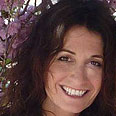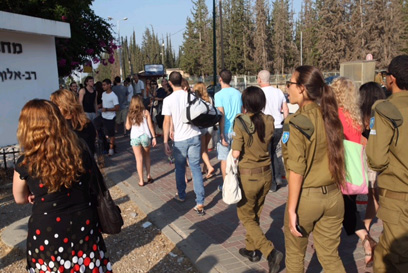
Asi Berman-Dayan
Back in Israel after 21 years
Op-ed: Despite hardships, woman who left comfort of New Jersey believes Israel is the place for her family
This past Yom Kippur, a day of soul-searching, was my second in Israel since returning from the US after 21 years. During the first Yom Kippur here I found it difficult to examine my actions and my life in general because I was still exhausted from the relocation. I began a new chapter in my life here with two of my children, while their father and one our daughters remained in the States. A family that was so connected unraveled so that a dream, which is difficult to understand sometimes, could be realized.
Twenty-one years in America could have easily dragged on forever, but the period ended when I just couldn't take it anymore. I've heard about all those who leave Israel and find that they can't go back, and every day I meet Israelis who dream of escaping to the calm and the illusion. We left in 1990 because we saw no future here. Our story since then is all too common: A young couple (we both left the kibbutzim in which we grew up) tries to start a business in Tel Aviv and has to deal with the Tax Authority and obtaining permits; the man performs reserve duty during the first intifada (60 days a year), we go to university, work around the clock, and at the end of the month we are left with very little money and even less energy. So, out of desperation, we left the land of impossible limitations to the land of unlimited dreams: America.
We arrived with two suitcases and a sea of hopes and dreams, whose waves crashed on Brooklyn's dreary beach. A rented basement with a window to the snow replaced the white, well-lit apartment in the heart of Tel Aviv. My husband worked at a carwash, and I continued my studies at a local college after transferring my credits from the university in Tel Aviv. A few months later we moved from the frightening Brooklyn of the early 90s to Queens, which was better suited for us due to the large Israeli population. A few more months past, and I had my first child, in the Diaspora; lonely and far away. Phone calls to Israel were very expensive back then, but that was the exile tax we had to pay. Two years later we moved to New Jersey, with all its green and sleepy towns.

Author with husband
Meanwhile, our second daughter was born and I completed my master's degree. Sleepless nights and a husband who is seeking financial independence, with all the successes and failures this process entails. A few years later our son was born. At around this time we purchased a home in a town that has become increasingly Israeli in character over the past few years, and we do not really feel like strangers.
The kids are full-fledged Americans. Well, almost, because at home I was a dictator. We spoke mostly Hebrew, but most of their reading and the language they spoke during Barbie games was English. The summers were usually spent in Israel; in the kibbutz of my childhood. And it was during these vacations that I facilitated my children's attachment to our home country.
During those years I was living out of a mental suitcase. There were always practical reasons for not going back; there was more to lose by leaving everything behind. Our eldest daughter was about to graduate high school and begin college, so who knew where the wind would take her and her siblings?
Then she chose to join the IDF as a lone soldier. She was surrounded by great people, but there were huge cultural gaps, and she did not have her family there to support her. Despite the hardships, at the end of the process she realized her place was in Israel. Yes, here, in this country, which is so difficult and full of questions marks, but also has one big exclamation mark. Because it is ours! I packed myself and our lives and arrived in Israel last summer.

Lone soldier (Illustration: Motti Kimchi)
By the time we returned our second daughter was in the 11th grade. The school in our American town was considered one of the best in the country, and, just like her older sister, she grew up in a very academically challenging environment. She began the school year and was immediately showered with love from the other students and was helped by a supportive faculty. Yet still she felt lost and unable to express herself and the knowledge she had accumulated during her years in American schools. Eventually I had to let go and allow her to return to the US to live with her father so she could finish high school there. My husband remained in the States for economic reasons, and she has joined him for the next two years.
Due to these changes and obligations that are dictated by reality, we meet only once every few months. This poses a great challenge to our marriage and to the unity of the family as a whole.
My eldest daughter is already in the second year of her bachelor's degree, and, more than ever, she sees her life being built here, in the homeland she did not grow up in but is extremely attached to. We enrolled our son in a small elementary school with a staff that is full of willingness and good intentions, but the system could not fill the gaps. With all the benefits and support supposedly offered to new olim, I still found myself translating entire books and looking for creative ways to close the language and cultural gaps.
In all honesty, I cherish each day here, despite the absorption issues. At least I speak the language and am familiar with the mentality. But I can't escape the thought of how difficult it must be for new olim who do speak Hebrew fluently. It is not easy to live in this country, where one has to deal with bureaucracy on a daily basis. In New Jersey there is a certain peace of mind, and comfort and order, but the taste of life there seemed synthetic, while here the taste is so real. Sure, it tastes bitter sometimes, but the sweetness comes straight from the heart.

Sleepy New Jersey (Illustration: Shutterstock)
The tears and frustration of the absorption process slowly mesh with new smiles of hope, and it seems we that have overcome the big cloud that hovered over us. This past Yom Kippur I already went out and saw a different world; one that is good for my soul. The streets were filled with children riding bicycles and playing games. No electronics that take away the innocence. Peace, quiet, and the perfect balance between the spirit and the soul; between tradition and my inner self. A time of soul-searching and insight.
Every Israeli who returns to the country is often asked: "Why did you come back? Are you crazy?" This question does give me pause, as clouds of war are looming and our lives seem to be headed to the unknown. But we do not know what tomorrow holds or how we were inscribed in the book of life, and I choose to believe and hope that this country, which was not my home for 21 years, is the place where I can rebuild my family's home and live well and feel happy, in body and soul.
Asi Berman-Dayan is married to Gigi and is the mother of Gal, Zooey and Uri. She studied psychology and organizational communication. She also writes and gives lectures.










